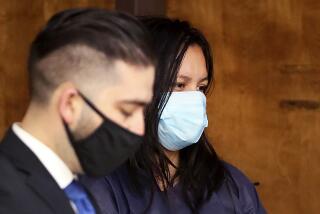Teachers Describe Caro as a Caring, Involved Mother
- Share via
As a classroom volunteer, she would come early and stay late. Socorro Caro was a mother who gave art lessons in class, made cookies for the kids, drove carloads of students on field trips, and--more than anything--was there for her children.
That was the glowing portrait that emerged Thursday in testimony from two teachers who got to know Caro when her sons attended Santa Rosa Elementary School in Camarillo. Both said they still think of her as a wonderful mother--despite her conviction on Nov. 5 for murdering three of her four young boys.
“She was a woman who just couldn’t help but love,” said Patty Meyer, Joey Caro’s first-grade teacher.
The teachers testified in the defense’s effort to convince jurors that Caro’s life is worth sparing. During the trial’s penalty phase, the 10 women and two men who convicted her are to recommend either a death sentence or life in prison without parole.
In their cross-examination of the teachers on Thursday, prosecutors reminded the jurors of other violent acts that Caro allegedly committed.
Deputy Dist. Atty. Cheryl Temple asked Meyer whether her opinion of Caro would be changed by knowing that she had punched her husband or once brandished a gun at him while young Joey looked on.
“No,” Meyer replied. “I know her as a sweet and loving person.”
Under questioning from Temple, the retired teacher said not even the killings could change her belief that Caro was a devoted parent. “As I know her, she’s an outstanding mother,” Meyer said.
She said Caro worked three or four hours weekly in her classroom and displayed nothing but affection toward her son and the other children.
When Meyer became a grandmother, Caro gave her “a beautiful little china box, with a note saying it was for a lock of hair,” Meyer said, dabbing tears from her eyes. “I still have it on my end table.”
Another Santa Rosa teacher, Carol Bjordahl, also praised Caro for her devotion to Joey, a good student who required extra help in some areas because of his attention deficit disorder.
When Joey was in Bjordahl’s third-grade class, she was called
away suddenly to be with her dying mother. Caro helped her deal with her mother’s death, Bjordahl testified.
“She got me to focus on the happy things,” she said, adding that a month later, Caro threw her a surprise bridal shower in the classroom.
But focusing on the positive wasn’t so easy for Caro herself, according to a family therapist who treated her for about a month before the slayings.
Kady Nygren said she had tentatively diagnosed Caro as suffering a major depression. Caro had “a poor sense of self,” Nygren said, and needed help expressing anger appropriately.
“I told her there should be no touching when she was angry,” Nygren said. “I told her it was important for her to separate when she became angry.”
Prosecutor Jim Ellison tried to cast doubt on Nygren’s diagnosis, pointing out that she works full time as a Thousand Oaks kindergarten teacher and only part time as a therapist.
The defense has argued that Caro was severely depressed on the night of Nov. 22, 1999, when she shot her boys as they slept. Caro’s attorneys also contend her judgment was clouded by a mix of Prozac, the anti-anxiety medication called Xanax, a diet pill and tequila.
After she was taken to Los Robles Regional Medical Center in Thousand Oaks with a self-inflicted gunshot wound to the head, her blood-alcohol level was measured at nearly twice the legal limit for driving, according to testimony.
More to Read
Sign up for Essential California
The most important California stories and recommendations in your inbox every morning.
You may occasionally receive promotional content from the Los Angeles Times.














